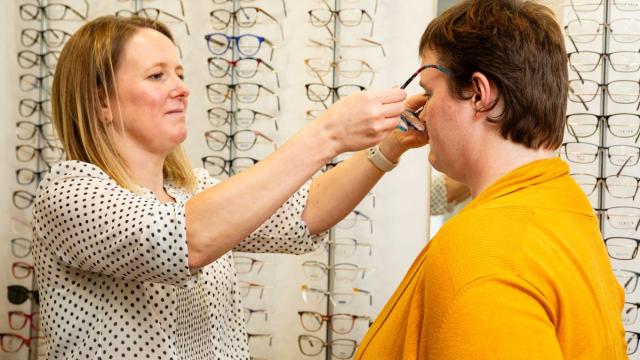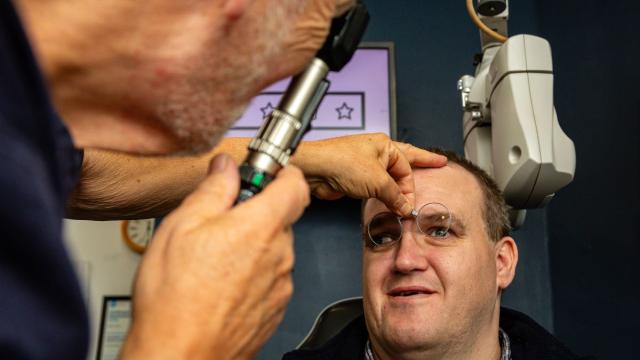Getting new glasses adults (easy read)
Easy read fact sheet on getting new glasses. Includes sticker templates to put in your glasses case to help you remember what your glasses are for.

Everybody’s sight gets worse as they get older.

The person who tests your eyes is called an optometrist.
We will call them an optician in this factsheet.

You should have an eye test at an optician’s every year.

Most people need glasses at some time in their life.

After your eye test the optician may say you need new glasses.

You might need glasses to see things close to you:
- Using your phone

- Eating

- Using a computer

You might need glasses to see things further away:
- Watching TV

- Watching a show or film

- Going out

Wearing the right glasses will help you see clearly.

Some people need to wear glasses all the time.

Your optician will tell you why you need glasses.
They will give you a prescription which tells you about the glasses you need.

You can go to any optician to get your glasses.

You need to take your prescription with you to the optician.
You may get help to pay for your glasses.

We have a form called – ‘Feedback from my optometrist’.
You can ask the optician to fill this form in.
It will explain why you need glasses.

To help you remember which glasses are for which activities:
You may need 2 pairs of glasses.
Glasses for seeing things close to you and glasses for seeing things further away.

You could have different colour glasses.

You could have different colour glasses cases.
You could use stickers on the case to show what activities they are for.

Some people need glasses with special lenses.
Bifocals or varifocals are glasses that have special lenses.
The lenses will help you see further away and close to you.

You can get glasses that help you see clearly that are also sunglasses.

Some glasses have lenses that go dark when the sun is out.

There are lots of frames that are very strong or very thin or flexible.
These frames might fit your face better.
The optician will help you choose the right glasses.

You may need to pay some money for your glasses.
Talk to the optician about the cost of your glasses.
may be able to get a voucher that makes your glasses cheaper.

The optician will make sure the glasses you choose fit.
They will measure you to check the glasses fit well and will be comfortable.

When choosing your glasses, ask if you can see a dispensing optician.
A dispensing optician has extra training to help choose and fit glasses.

It may take a week or more for them to make your new glasses for you.

It is important to wear your new glasses.
Tell people who support you about your eyesight.
People need to know why you wear glasses.

Write why you wear glasses in your health action plan or support plan.

Your glasses will make you see things more clearly.
If you used to sit close to the TV you may want to sit further back now.

If you used to look at things very closely you may be able to hold things further away now.

Everyone needs glasses that fit well on their nose and ears.

This means that you can look through the middle of the lens.

If you wear a hearing aid your glasses should fit comfortably over your ear and hearing aid.

Make sure you can see through the clear lens of your glasses.

It can be easy to notice when glasses do not fit properly.

It might take some time to get used to wearing your new glasses.

The world might look different too.
You may have got used to things looking blurred or not clear before you got your glasses.

You should see things more clearly with your glasses.

Wear your new glasses when you are doing something you enjoy.

Wear your new glasses for a short amount of time at first.
Wear your glasses around your house or garden until you are used to how things look when you are wearing them.

Take your glasses out with you.
Take your glasses with you when you go out with friends, to work, day services, college, shopping or other places.

If you have 2 pairs of glasses, you can carry the second pair in your glasses case in your bag.

If your wheelchair has head rests make sure that your glasses are comfortable.
Your supporter can help you check they are comfortable and do not slip out of place as your head settles against your head rest.

You should make sure your supporters do not place you facing into bright sun as this might be very uncomfortable for you.



